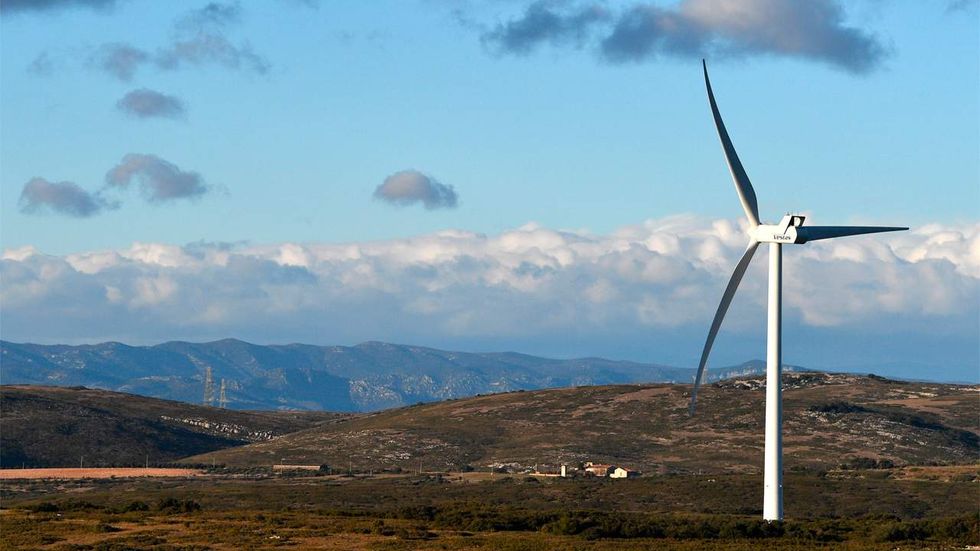
This photo taken on January 13, 2017 near Villeveyrac, southern France, shows wind turbines. (Photo by PASCAL GUYOT/AFP/Getty Images)

Writing for Watts Up With That, “the world’s most viewed site on global warming and climate change,” Helen Schwiesow Parker, Ph.D., laid out a detailed case suggesting the wind industry has caused “adverse human health effects,” including many negative psychological problems, such as depression. Parker is a licensed clinical psychologist and a former faculty member at the University of Virginia Medical School.
According to Parker’s article, published March 8, “Infrasound (inaudible) and low-frequency (audible) noise (slowly vibrating sound waves collectively referred to as ILFN) produced by Industrial-scale Wind Turbines (IWTs) directly and predictably cause adverse human health effects. The sonic radiation tends to be amplified within structures, and sensitivity to the impact of the resonance increases with continuing exposure.”
Parker said there “is no mystery” surrounding why massive wind turbines cause health problems, including many psychological problems.
“The primary pathway of turbine assault on human health is no mystery,” wrote Parker. “The Israeli army has used low-frequency sound pulses as high-tech crowd control for years. People are made nauseous and confused, with blurred vision, vertigo, headaches, tachycardia, heightened blood pressure, pain and ringing in the ears, difficulties with memory and concentration, anxiety, depression, irritability, and panic attacks.”
The wind industry has long been promoted as a key part of Democrats’ plan to replace traditional energy sources, such as oil and natural gas, with renewable energy. As part of former President Barack Obama’s effort to stop global warming, which he believes to be caused by humans, the Environmental Protection Agency created the Clean Power Plan, a federal policy requiring states to reduce their carbon-dioxide emissions by adopting “green energy” policies.
Parker says this policy and others that promote the use of wind energy are nothing but an “obscenely costly, mostly useless energy redundancy scheme” that “funnels unimaginable profits from our taxpayer and rate-payer pockets to its inner circle, while knowingly ignoring its victims’ desperate pleas for relief – and indeed ridiculing them and trying to bury all the growing evidence of harm to their health and wellbeing."
“We’ve witnessed three decades of this callous, mercenary assault, this arrogant denial of what is known to be true, this untold suffering of thousands of innocent victims around the world,” wrote Parker. “It’s time to bring in the human rights and social justice referees – and call ‘game over.’”
President Donald Trump has said he opposes the government-mandated use of renewable energy on a wide scale, and in just his first two months in office, he’s taken significant steps to roll back many of the Obama administration’s climate and energy policies. In January, Trump brought the Keystone XL Pipeline back to life and granted in February approval of the Dakota Access Pipeline, a project that is expected to bring to North Dakota $100 million in additional tax revenues, according to the Associated Press.
Trump also appointed Scott Pruitt, the former attorney general of Oklahoma, to run the EPA. Pruitt was an ardent critic of the EPA while serving as attorney general, and he’s promised to implement policies that will protect the environment and allow for significant domestic energy development.
Pruitt criticized Obama-era policies that imposed renewable-energy sources, such as wind power, on states, and he recently came under fire for saying he does not believe there is substantial evidence proving humans are the primary cause of climate change.
“No I, no I think that, that measuring with precision human activity on the climate is something very challenging to do and there’s tremendous disagreement about the degree of impact,” said Pruitt to CNBC’s Joe Kernen on March 9. “So no, I would not agree that it’s a primary contributor to the, to the global warming that we see. But we don’t know that yet, as far as, we, we need, we need to continue the debate, continue the review and the analysis.”
Justin Haskins